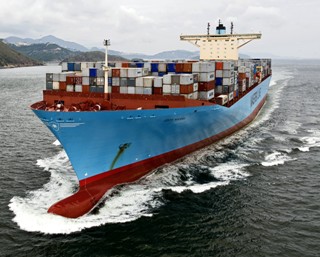 Maersk Line introduces in October 2011 Daily Maersk, a new service on the Asia-North Europe trade lane that offers precision delivery seven days a week and promises monetary compensation for late deliveries.
Maersk Line introduces in October 2011 Daily Maersk, a new service on the Asia-North Europe trade lane that offers precision delivery seven days a week and promises monetary compensation for late deliveries.
“Daily Maersk will dramatically change the way shipping is done. It offers a daily cut-off at the same time every day, seven days a week, and always with the exact same transportation time,” a Maersk press statement said.
The service, to observe its first cut-off on October 24, will have 70 vessels operating a daily service between four ports in Asia (Ningbo, Shanghai, Yantian, and Tanjung Pelepas) and three ports in Europe (Felixstowe, Rotterdam, and Bremerhaven) in what amounts to a giant ocean conveyor belt for the world’s busiest trade lane.
No matter which of the four Asian ports the cargo is loaded at, the transportation time—from cut-off to cargo availability—is fixed, according to Maersk. Daily cut-offs mean that cargo can be shipped immediately after production without the need for storage.
Denmark-based Maersk Line said that cargo at the other end will be available for pick-up on the agreed date. If containers don’t arrive on time, monetary compensation will be provided, which the liner said is an industry first. For cargo delayed by one to three days, Maersk Line will pay US$100 per container. Cargo delayed by four days or more will be paid $300 per container.
“We set out to design a service that takes the stress out of our customers’ lives, to change shipping from the weakest to the strongest link in the supply chain. After all, shipping is only around 2 percent of our customers’ total cost. And yet our unreliability has until now forced them to shape their production plans and inventory around it,” says CEO Eivind Kolding.
Maersk Line, the world’s largest container liner, claimed that as a general rule, shipping lines serving the Asia-North Europe trade are unreliable—44 percent of all containers are late, 11 percent are more than two days late, and as much as 8 percent are more than eight days late.
“The lack of on-time delivery costs our customers large sums of money because it makes shipping more of an art than a science. Companies have to make up for an unreliable supply chain; they are forced to build a buffer in their supply chains and lose income when goods are not on time,” Kolding explains.
Head of logistics at the electronics giant Pegatron, Andy Tron, explained: “Reliability should be a key performance indicator for all carriers. Today, 10 percent of all our shipments are more than two days late, so we are of course doubtful any carrier can provide guaranteed reliability. But if it is possible and if it is combined with more frequent departures to meet our production schedule, it would allow us to lower our inventories and significantly lower our costs.”
Photo by Maersk Line




